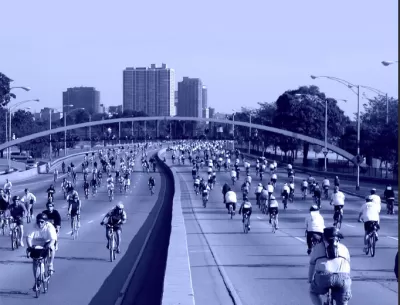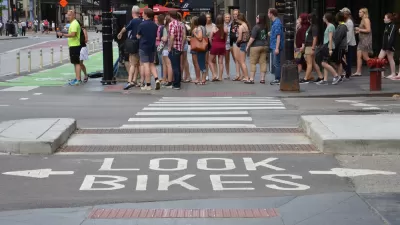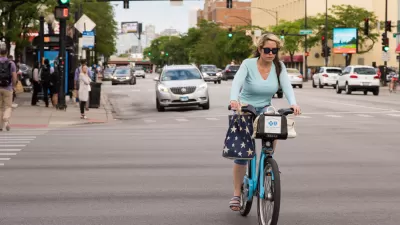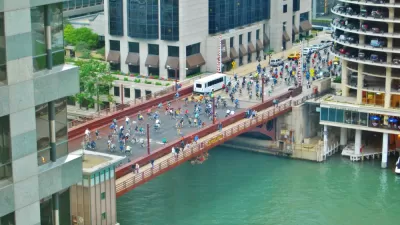The city, which has been slow to implement complete streets initiatives during the pandemic, promises closer collaboration with community groups to advance equity in transportation.

In a year when many cities used the pandemic as an opportunity to rethink public space and implement ambitious initiatives to improve walking and biking infrastructure, writes Courtney Courtney Cobbs, Chicago's progress on similar projects has been disappointingly slow. However, Cobbs hopes that a renewed focus on mobility justice and equity in the Chicago Department of Transportation (CDOT)'s Complete Streets division shows promise for the future of transportation equity in the city.
Although the agency suspended their quarterly bicycle and pedestrian advisory council meetings last year, a notice sent out in September announced CDOT's plans for a Transportation Equity Network to "develop closer relationships with communities and long-term strategies for mobility justice." To make walking and biking safe and accessible for Chicago's most vulnerable communities, Cobbs argues, the agency has to "make a concerted effort to increase the representation of women, gender-nonconforming individuals, Black and Brown folks, people with disabilities, and other marginalized people whose mobility needs have not been centered in previous transportation decisions" as well as decrease the power that car owners and individual aldermen have over the city's land use and transportation decisions. "Part of ensuring [transportation equity] means making sure the community engagement process centers those who have been missing from the decision-making process."
The Transportation Equity Network is one of two significant equity plans to focus on transportation in recent months. The city also released an Equitable Transit-Oriented Development policy plan in September 2020.
FULL STORY: Will CDOT’s new strategic plan be a turning point for equitable transportation?

Alabama: Trump Terminates Settlements for Black Communities Harmed By Raw Sewage
Trump deemed the landmark civil rights agreement “illegal DEI and environmental justice policy.”

Planetizen Federal Action Tracker
A weekly monitor of how Trump’s orders and actions are impacting planners and planning in America.

The 120 Year Old Tiny Home Villages That Sheltered San Francisco’s Earthquake Refugees
More than a century ago, San Francisco mobilized to house thousands of residents displaced by the 1906 earthquake. Could their strategy offer a model for the present?

Ken Jennings Launches Transit Web Series
The Jeopardy champ wants you to ride public transit.

BLM To Rescind Public Lands Rule
The change will downgrade conservation, once again putting federal land at risk for mining and other extractive uses.

Indy Neighborhood Group Builds Temporary Multi-Use Path
Community members, aided in part by funding from the city, repurposed a vehicle lane to create a protected bike and pedestrian path for the summer season.
Urban Design for Planners 1: Software Tools
This six-course series explores essential urban design concepts using open source software and equips planners with the tools they need to participate fully in the urban design process.
Planning for Universal Design
Learn the tools for implementing Universal Design in planning regulations.
Clanton & Associates, Inc.
Jessamine County Fiscal Court
Institute for Housing and Urban Development Studies (IHS)
City of Grandview
Harvard GSD Executive Education
Toledo-Lucas County Plan Commissions
Salt Lake City
NYU Wagner Graduate School of Public Service





























